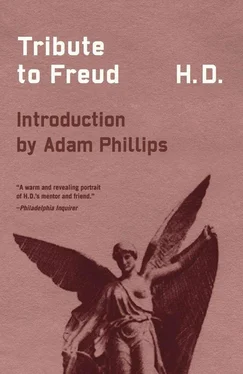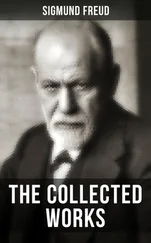It is easy now for a psychoanalyst or a so-called patient to be struck in H. D.’s account by just how unorthodox a Freudian Freud was: he lends H. D. books, introduces her to his family, shows her his art-objects, talks about another patient, and generally gossips with her. There is an ease and a friendliness and a sense of real enjoyment in the way Freud works with H. D., that is not at all incompatible with the seriousness of the project, and that is the real lesson of the master (it reveals how strangely professionalized and hemmed in the psychoanalysts quickly became, caricatured and discredited rather than engaged with). And it is equally easy for the contemporary reader to distrust H. D.’s patent almost awestruck admiration of Freud: “with the Professor,” she writes, “I did feel that I had reached the high water-mark of achievement; I mean, I felt that to meet him at forty-seven, and to be accepted by him as analysand and or student, seemed to crown all my other personal contacts and relationships, justify all the spiral-like meanderings of my mind and body. I had come home, in fact.” You don’t need to be Sigmund Freud, as it were, to read this as the child’s idealization of her parents (“I had come home, in fact”: or rather in fantasy, because no home is quite like that). There is a glancing acknowledgment when the first sentence is qualified by “I mean,” that she might have reached a “high water-mark of achievement” with Freud and not merely by just meeting him. H. D.’s admiration for Freud gave her an appetite to speak, not to submit; an appetite to write, but not in Freud’s language. H. D. never became a Freudian, or even a follower; she simply went on being the writer she was becoming.
Read closely it is clear that despite, or because of, her being so impressed by Freud — and Freud explicitly encourages this — H. D. goes her own way and gets what she seems to want from the analysis (when she refers to Freud’s “infallibility” she knows what she is doing, and she knows the irony of what she is saying). One of the things she gets, of course, from the analysis is her Tribute to Freud , a piece of writing so artfully akin to a person speaking on the couch that it can and should be read, at least in the first instance, with no scholarly annotation or commentary, the reader, like the analyst, picking things up as she goes along. Indeed, H. D.’s tribute, whatever else it is, is that rare thing, an account of a genuine collaboration, a testimony to the pleasure H. D. and Freud took in each other’s company.
What analysts call “idealization” — often misleadingly, and often misleadingly equating it with a kind of masochism — may be one of the preconditions for collaboration (as it is for parenting, and for falling in love, and indeed for reading and writing). Psychoanalysis could be an after-education, to use one of Freud’s words, in collaboration; it could be the aim of a psychoanalysis to enable the patient and the analyst, like Freud and H. D. in this unique account of an analysis, to take such pleasure in each other, to be free to be so interested and interesting to each other. H. D., like Freud, but in a quite different way, was able to use psychoanalysis as a means to her own ends, but without needing to know, beforehand, what they were. “My discoveries are not primarily a heal-all,” H. D. reports Freud saying to her, “My discoveries are a basis for a very grave philosophy. There are very few who understand this, there are very few who are capable of understanding this.” H. D., it seems, was one of the very few.
Adam Phillips
“Writing on the Wall,” to Sigmund Freud, blameless physician, was written in London in the autumn of 1944, with no reference to the Vienna notebooks of spring 1933.
“Writing on the Wall” appeared in Life & Letters Today, London, 1945–1946.
“Advent,” the continuation of “Writing on the Wall,” or its prelude was taken direct from the old notebooks of 1933, though it was not assembled until December 1948, Lausanne.
H. D.
WRITING ON THE WALL TO SIGMUND FREUD
It was Vienna, 1933–1934. I had a room in the Hotel Regina, Freiheitsplatz. I had a small calendar on my table. I counted the days and marked them off, calculating the weeks. My sessions were limited, time went so quickly. As I stopped to leave my key at the desk, the hall porter said, “Some day, will you remember me to the Professor?” I said I would if the opportunity arose. He said, “— and ah, the Frau Professor! There is a wonderful lady.” I said I had not met the Frau Professor but had heard that she was the perfect wife for him and there couldn’t be — could there? — a greater possible compliment. The porter said, “You know Berggasse? After the — well, later when the Professor is no longer with us, they will name it Freudgasse.” I went down Berggasse, turned in the familiar entrance; Berggasse 19, Wien IX, it was. There were wide stone steps and a balustrade. Sometimes I met someone else coming down.
The stone staircase was curved. There were two doors on the landing. The one to the right was the Professor’s professional door; the one to the left, the Freud family door. Apparently, the two apartments had been arranged so that there should be as little confusion as possible between family and patients or students; there was the Professor who belonged to us, there was the Professor who belonged to the family; it was a large family with ramifications, in-laws, distant relatives, family friends. There were other apartments above but I did not very often pass anyone on the stairs, except the analysand whose hour preceded mine.
My hours or sessions had been arranged for me, four days a week from five to six; one day, from twelve to one. At least, that was the arrangement for the second series of sessions which, I have noted, began the end of October 1934. I left a number of books and letters in Switzerland when I left there, actually after the war had begun; among them was my 1933 Vienna diary. I am under the impression that the Professor had arranged the second series to accord with the first, as I had often said to him that that near-evening hour was almost my favorite of the whole day. Anyhow, I had five weeks then. The last session was December 1, 1934. The first series began in March 1933 and lasted somewhat longer, between three and four months. I had not planned on coming back to Vienna, but a great deal had happened between the summer of 1933 and the autumn of 1934. I had heard the news of the Dollfuss affair with some anxiety, but that had not caused any personal repercussions. I came back to Vienna because I heard about the man I sometimes met, coming down the stairs. He had been lecturing at a conference in Johannesburg. He flew his own plane there. On the way back, he crashed in Tanganyika.
I did not always pass him on the stairs. He might be lingering on, prolonging his talk in the Professor’s study or consulting room, in which case, after hanging up my coat in the hall, I might miss him. I would be ushered direct into the waiting room. Or it might happen that my predecessor emerged from the Professor’s sanctum at the same time that I was about to enter. He would be reaching for his coat or his hat while I was disposing of mine. He was very tall, he looked English — yet English with a catch. He had, it later appeared, spent some time at Oxford, before or after receiving his Continental degree — in any case, he was not German, not American; but how does one know these things? He was, as it happened, exactly what I thought him, “English with a catch,” in fact, a Dutchman.
Читать дальше











